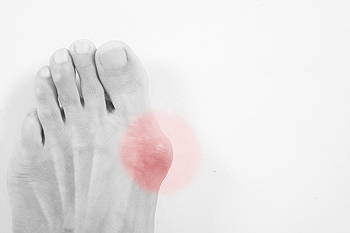
A bunion is a noticeable foot condition. It is a hard lump that develops on the base of the big toe, and if not promptly treated, it may cause the other toes to shift toward each other. It is a common condition that can happen from wearing shoes that do not have ample room for the toes to move freely. As the bunion becomes larger, corns may form on the side of the bunion as it touches the shoe. Genetic factors may contribute to a bunion, and surgery may be an option for permanent removal. A bunion can be uncomfortable and may cause arthritis to develop. Additionally, as it grows, it may become swollen and red, likely causing the need to purchase larger shoes. Relief may be found when the correct shoe size is worn, and a protective pad is put over the bunion to reduce friction from shoes. Bunions are treated by a podiatrist, and it is strongly urged that you contact this type of doctor to determine what the best treatment is for you.
If you are suffering from bunion pain, contact one of our podiatrists of Fusion Foot and Ankle. Our doctors can provide the care you need to keep you pain-free and on your feet.
What Is a Bunion?
Bunions are painful bony bumps that usually develop on the inside of the foot at the joint of the big toe. As the deformity increases over time, it may become painful to walk and wear shoes. Women are more likely to exacerbate existing bunions since they often wear tight, narrow shoes that shift their toes together. Bunion pain can be relieved by wearing wider shoes with enough room for the toes.
Causes
- Genetics – some people inherit feet that are more prone to bunion development
- Inflammatory Conditions - rheumatoid arthritis and polio may cause bunion development
Symptoms
- Redness and inflammation
- Pain and tenderness
- Callus or corns on the bump
- Restricted motion in the big toe
In order to diagnose your bunion, your podiatrist may ask about your medical history, symptoms, and general health. Your doctor might also order an x-ray to take a closer look at your feet. Nonsurgical treatment options include orthotics, padding, icing, changes in footwear, and medication. If nonsurgical treatments don’t alleviate your bunion pain, surgery may be necessary.
If you have any questions, please feel free to contact our offices located in Fort Worth and Arlington, TX . We offer the newest diagnostic and treatment technologies for all your foot care needs.


